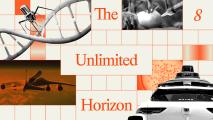
Biotech
Human history has been all but defined by death and disease, plague and pandemic. Advancements in 20th century medicine changed all of that. Now advancements in 21st century medicine promise to go even further. Could we bring about an end to disease? Reverse aging? Give hearing to the deaf and sight to the blind? The answer may be yes. And soon.
More
Why tomorrow’s longevity treatments could be divided by sex
Why women consistently outlive men is a mystery — and it may influence the future of longevity medicine.
The longevity movement is growing — but it needs to go global
Progress in longevity is real, but experts say the field needs government funding, policy reform, and public buy-in to reach its potential.
Experts weigh in on popular “anti-aging” treatments: real or scam?
Experts cut through longevity hype, debunking supplements, IV drips, and cold plunges while pointing to what actually works.
Who wants to live forever? Not me.
Most Americans remain wary of immortality, and research helps explain the mix of ethics, faith, and fear behind that resistance.
Aubrey de Grey: “We need a COVID-scale war on aging.”
Biomedical gerontologist Aubrey de Grey discusses the burgeoning longevity movement and barriers to its progress.
Retro Biosciences wants to add 10 healthy years to your life
Backed by $180 million in funding from OpenAI’s Sam Altman, Joe Betts-LaCroix’s Retro Biosciences is racing to extend the human healthspan.
My time among the immortality tribe
Field notes from Vitalist Bay, an 8-week longevity zone in Berkeley where CEOs, scientists, and activists united to fight aging.
Forget just living longer. Eric Topol wants to help Americans live better, too.
In “Super Agers,” the writer and medical researcher maps a path to extending healthspan with AI, targeted drugs, and lifestyle changes.
AI deadbots can keep “you” around after death — what does that mean for the living?
We can now use AI to create versions of real people that can live on long after their bodies die. But should we?
Immortality isn’t progress. It’s paralysis.
The pursuit of immortality ignores how death powers life’s natural cycles, from cellular turnover to ecological renewal and adaptation.
The promise of longevity: A future with more time — and more meaning
An introduction to Freethink’s Longevity Issue: features, essays, and op-eds on the science, ethics, and promise of longer, healthier lives.
Groundhog Day and other eternal nightmares: Five philosophical takes on living forever
From eternal recurrence to techno-dualism, five philosophical visions of immortality — and why most paths to forever end badly.
Ancient Olympians wouldn’t qualify for today’s Games
Across history, the human body has been reshaped by discipline, medicine, and now technology — each era redefining peak performance.
From cryonics to aging: How AI is transforming human health
From curing rare diseases to extending lifespans, four biotech founders share how AI is rewriting the future of medicine.
What if humans mastered every aspect of nature?
A bold vision of a 10x better future where humanity has mastered biology, energy, and matter to unlock unprecedented progress.
AI’s next frontier: Modeling life itself
Biologists are skipping the petri dish and using AI-powered virtual cells to experiment in silico.
Second opinions in the age of ChatGPT
ChatGPT and other AI-powered tools are quietly reshaping how people interpret, challenge, and act on medical advice.
How consensus can undermine science
The main objective of consensus statements appears to be to reduce doubt, which may stifle scientific inquiry.
Pac-Man turned 45 today. The surgeon general once warned that playing it could make kids violent.
Officials’ warnings about the impact of video games on kids were never proven true. They may be making the same mistake with social media.
Flexible brain implant takes major leap forward
The FDA’s clearance of Precision Neuroscience’s flexible electrode array pushes the startup ahead in the race to BCI commercialization.
Get inspired with the most innovative stories shaping the world around us.

































